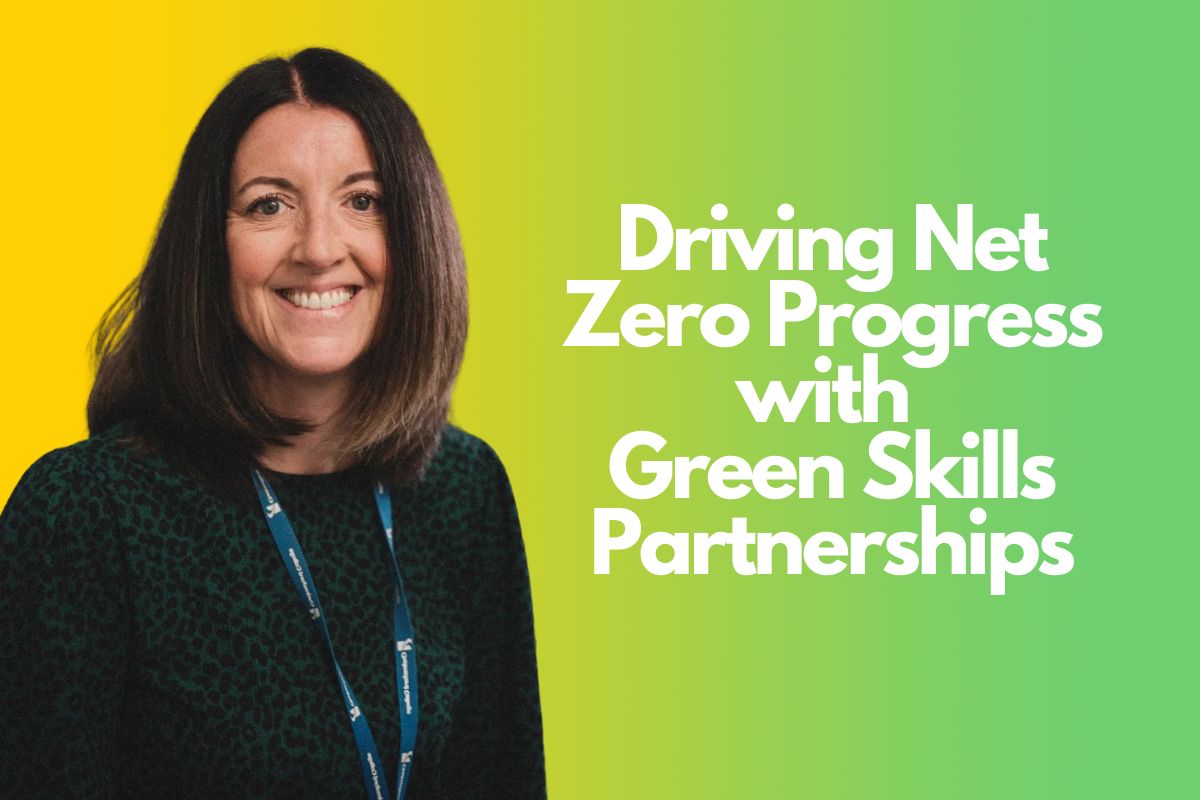Driving Net Zero Progress with Green Skills Partnerships

Sarah outlines how the green skills gap poses a significant challenge to the UK’s net-zero ambitions, with only one in eight workers having relevant skills. The college is tackling this through partnerships, training programs, and a Green Skills Fair, helping prepare for 725,000 projected green jobs by 2030.
The Green Skills Challenge
As the UK moves toward its ambitious goal of achieving net-zero emissions by 2050, the conversation about how we prepare for this shift is more important than ever. At Chelmsford College, we’re right at the heart of this, working with our partners to ensure that the workforce of tomorrow is ready to take on the challenge.
When we talk about green skills, it’s easy to think we’re just focusing on new technologies or niche jobs within renewable energy. But the reality is much bigger. The green skills gap is affecting every sector—from construction to engineering to IT— and we need to act now to address it.
National Skills Gap: The Numbers
The UK stands to gain up to 725,000 green jobs by 2030, according to projections from the Confederation of British Industry (CBI). This represents a significant opportunity, with the low-carbon economy potentially contributing over £50 billion annually to GDP. However, despite this promising future, a critical shortage of skills threatens to hamper progress.
According to LinkedIn data, only one in eight workers currently possesses ‘green skills’. This gap is especially prominent in industries like energy and construction, where a combined shortfall of around 430,000 workers is projected by 2030.
Essex’s Green Skills Landscape
And the local picture reflects this, with green skills being listed as a priority area in the Essex LSIP. A survey of employers and education providers in the region also revealed that 30% of employers will require green skills development in the next 3-5 years.
We are working with the Local Authority and Essex Chamber of Commerce to address this. This includes initiatives such as developing green skills and low carbon training hubs across the county and integrating green skills awareness into all our study programmes.
This isn’t however just a workforce issue; it is a major risk to our ability to decarbonise these industries and meet our environmental targets. We need to ensure that the future workforce is both job-ready and eco-literate. Every stakeholder—whether a college like ours, a business, or a local authority—has a role to play in equipping people with the skills and knowledge to make sustainable progress a reality.
Green Skills Fair: Connecting Opportunities
As part of our own contribution to this mission, we are hosting a Green Skills Fair next week (4 November). Funded and supported by Essex County Council, we’re bringing together over 50 local and national stakeholders, all with a focus on sustainability – including EDF Renewables, Balfour Beatty, Kier, Lush, East Wind Cluster Ltd, Veolia Woodland group, and Flannery under one roof.
Employers will be running various interactive workshops, from sustainable fashion to sustainable bricklaying techniques. It’s an opportunity for young people to see the variety of careers available in the green sector and for local businesses to connect with future talent
Building Strategic Partnerships
But beyond the employment piece, it’s a chance for us all to think about how we can work together more strategically, to make sustainability a core part of education and training.
This is where collaboration comes in. We work with employers to ensure that our qualifications and training programs align with the needs of local businesses. These partnerships allow us to create targeted training pathways that provide our students with the skills that are most in demand.
Leading by Example: Our Sustainability Journey
We are also leading by example in our own business. Following the road map created by the Climate Commission for UK Higher and Further Education, we achieved ‘established status’ in July. We are on a journey to achieve 75% reduction in emissions by 2035 and net zero by 2040 – and to do this, have started carbon literacy training to all staff and students. This includes removing all plastic from our college canteens, implementing a green travel plan and embedding sustainability in all curriculum areas.
Creating a Sustainable Future Together
This is about so much more than securing jobs. It is about securing a sustainable future and driving the green skills agenda forward. It’s vital that young people leave college not only with the technical skills required for their careers but also with an understanding of how their roles can contribute to the UK’s environmental goals.
The clock is ticking on climate change, and we can’t afford to sit back and wait. Colleges have an important role to play here – so let’s work collaboratively to help tackle the green skills gap and create a successful future for everyone.
By Sarah Hamilton, Director of Business Development, Chelmsford College











Responses